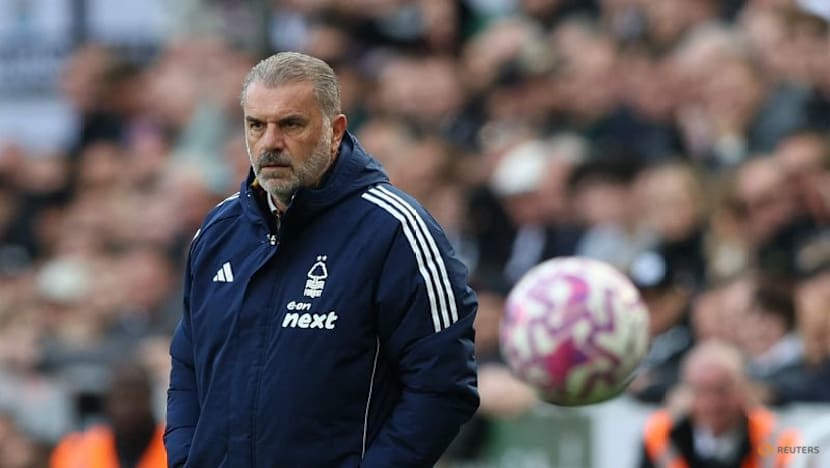Ambition burns at Postecoglou's old club as Australia launches second tier competition

Soccer Football - Premier League - Newcastle United v Nottingham Forest - St James' Park, Newcastle, Britain - October 5, 2025 Nottingham Forest manager Ange Postecoglou looks on REUTERS/Scott Heppell E
MELBOURNE :Professional ambitions are firing at the club where Ange Postecoglou cut his coaching teeth, as South Melbourne FC prepare to launch Australia's new second tier competition this week after languishing for years in the state league.
Postecoglou may be feeling the heat after a winless start at Nottingham Forest but his old team, nicknamed Hellas, are buzzing in the leadup to hosting Sydney Olympic in the Australian Championship opener on Friday.
Thousands of fans will flock to Albert Park's Lakeside Stadium to cheer on the four-times national champions in their first meaningful match against Olympic in more than 20 years.
For long-time supporters of both sides, Friday's match will feel like partial redress for a historical wrong when the debt-ridden National Soccer League collapsed in 2004.
Only a few of the old NSL clubs were brought on board when Australia's top flight was reborn as the A-League in 2005 with the help of billionaire Frank Lowy.
Hellas and twice national champions Olympic were among those left behind, relegated to the semi-professional purgatory of state-based competition.
South Melbourne mounted several campaigns to get into the A-League but were overlooked in favour of expansion clubs Melbourne Heart and Western United.
Heart became Melbourne City over a decade ago after they were bought out by the City Football Group, while Western United were recently cut from the league due to financial problems.
South Melbourne's management remain determined to take the club back to the big-time, even if as yet there are no plans to introduce promotion from the Australian Championship to the A-League.
"We haven't shied away from that from day dot," Football Director Peter Kokotis told Reuters on Wednesday.
"Two of the clubs they picked ahead of us are no longer here. We're still here."
Even with part-time staff and a roster of players who scurry off to regular jobs after early morning training, South Melbourne are not lacking in professional pride.
Their inner-city home is a quality boutique stadium that can pack in more than 10,000 people. The pitch is pristine and in the club rooms the trophy cabinets are crammed with silverware.
Postecoglou, who delivered back-to-back NSL titles as head coach in the 1990s, takes pride of place in a mural of club greats.
He played nearly 200 games for Hellas at left back, his own Greek origins reflecting the club's nickname and blue and white kit.
ROOTS IN MIGRANT COMMUNITIES
Many of Australia's prominent soccer clubs have their roots in southern European migrant communities, including Hellas, Olympic (Greek), Marconi Stallions (Italian) and Melbourne Knights (Croatian).
Despite passionate supporter bases, the clubs' ethno-national identities were deemed a liability by soccer authorities, who worried they might turn potential fans away.
The sport's federation repeatedly tried to remove ethno- national symbols from logos, playing kits and flags in the NSL, and in 2014 they were banned.
The much-maligned policy was ditched six years ago, and governing body Football Australia (FA) no longer opposes clubs celebrating their historical roots.
"We are a multi-cultural sport. We're 100 per cent celebrating that, in particular the histories of our clubs and bringing communities together," interim CEO Heather Garriock told Reuters.
In a city renowned for its large Hellenic community - Melbourne has the world's largest Greek-speaking population outside of Greece and Cyprus - Hellas are proud of their roots.
A number of staff have Greek heritage but the club also highlights the diversity of its squad, which is a melting pot of different backgrounds.
"It's something the club really want to rejuvenate, and get that (Greek) ethnic community back in here - not that it's gone," captain Marco Jankovic told Reuters.
"But it's not just the Greek community. I'm Serbian. All are welcome at this club, it's a special place to be."
With Australian Championship matches to be broadcast on national TV, Jankovic and his teammates aim to win new fans and, just maybe, impress a big-league scout.
"Everyone wants to play on a higher level and the boys deserve it," said head coach Sinisa Cohadzic.
"The opportunity is there."













